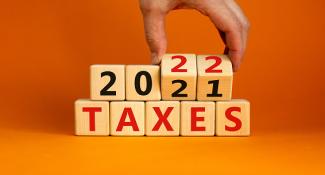
Handy "Cheat Sheets" for 2022 Tax Planning
2022 Tax Planning Cheat Sheets and Updates
By John H. Robinson Jan 8, 2022
As I do every year, I want to get the New Year (and tax season) off on the right foot by sharing my favorite tax planning “cheat sheets.” These are simple 2-page documents that neatly summarize much of the important tax rate information and plan contribution limits for the year ahead. In years past, I have typically provided Putnam Investments’ crib notes because of how well organized and comprehensive it is. This year, I am also including one from Delaware Life that may be even better. I don’t have any business relationship with either Putnam or Delaware, but I definitely appreciate their making these extremely handy documents available.
Putnam Investments 2022 Tax Rates Schedules and Contribution Limits
Delaware Life 2022 Tax Information
I have also stumbled upon a neat listing of all the federal tax filing and extension deadlines from Bench.co -When Are Taxes Due? 2022 Filing & Extension deadlines (Bench.co)
The most notable change for FPH clients from 2021 is probably the $1,000 increase in 401(k) salary deferral contribution limits from $19,500 last year to $20,500. However, the $6,500 catch-up contribution limit remains unchanged, so the total 401(k) deferral limit for 2022 is now $27,000 for participants age 50 and over.
Participants in Savings Incentive Match Plans for Employees (SIMPLE IRAs) will be able to contribute an additional $500 from payroll with the payroll deferral contribution limit rising from $13,500 to $14,000 this year.
IRA and Roth IRA contribution limits and catch-up amounts remain unchanged at $6,000 and $1,000, respectively.
Most of the rest of the changes pertain to inflation adjustments, such as the increase in the standard deductions for each of the four filing statuses, increases in the amount of wages subject to F.I.C.A., and increases in the phaseouts for deductible IRA and Roth IRA eligibility. These are all included in the Putnam and Delaware tables.
There is, however, one big new rule change for small business owners that has largely flown under the news radar. Beginning in 2021, business owners who receive more than $600 from digital payment services, such as PayPal and Venmo, and deposit those funds to a bank account need to make sure that they report this income on their tax returns. While businesses have always been required to do this, 2022 is the first year in which there is direct accountability, as all digital payment processors are now required to report that amount to the IRS. For more on this, see –
There’s a new tax rule for U.S. small business owners (The Guardian)
John H. Robinson is the owner/founder of Financial Planning Hawaii and a co-founder of software-maker Nest Egg Guru.
DISCLOSURES
Securities offered through J.W. Cole Financial, Inc. (JWC) member FINRA/SIPC. Advisory services offered through Financial Planning Hawaii and J.W. Cole Advisors, Inc. (JWCA). Financial Planning Hawaii and JWC/JWCA are unaffiliated entities.
Fee-only financial planning services are provided through Financial Planning Hawaii, Inc, a separate Registered Investment Advisory firm. Financial Planning Hawaii does not take custody of client assets nor do its advisers take discretionary authority over client accounts.
The information contained herein is general in nature. Neither Financial Planning Hawaii nor J.W. Cole provides client-specific tax or legal advice. All readers should consult with their tax and/or legal advisors for such guidance in advance of making investment or financial planning decisions with tax or legal implications

